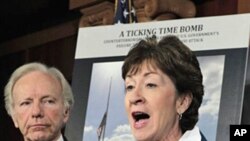A congressional investigation into the 2009 shootings at a U.S. Army base at Fort Hood, Texas, in which 13 people were killed, finds that federal authorities could have prevented the tragedy.
The report's title, "A Ticking Time Bomb" revealed its sobering contents. At a news conference on Capitol Hill, Senate Homeland Security Chairman Joseph Lieberman came straight to the point.
"Our report's painful conclusion is that the Fort Hood massacre could have and should have been prevented," said Lieberman. "We have reached that conclusion because our investigation found that employees of the Department of Defense and the FBI [the Federal Bureau of Investigation] had compelling evidence of Nidal Hassan's growing embrace of violent Islamist extremism in the years before the attack that should have caused them to discharge him from the U.S. military and make him the subject of an aggressive counter-terrorism investigation."
Major Hasan, a U.S. Army psychiatrist, is charged with the murder of 13 people and the attempted murder of 32 others who were wounded in the November 5, 2009, shooting. Witnesses say they heard Hasan shout "Allahu Akbar" (God is great) in Arabic just before he allegedly opened fire on a group of soldiers preparing for deployment.
The report says that Hasan had often publicly expressed support for al-Qaida and understanding for the September 11, 2001, terrorist attacks in the United States. The report says two of Hasan's associates had referred to the 41-year-old Muslim American of Palestinian descent as a "ticking time bomb." But his Army superiors failed to take any disciplinary action against him, the report concludes, and even said his understanding of radical Islamic beliefs could be an asset.
Senator Lieberman, a self-described "Independent Democrat" from Connecticut, said this points to a broader and more disturbing failure of the Pentagon to distinguish between the many law-abiding American Muslims within the ranks of its military forces and violent extremists.
"America's enemy is not terrorism, or a particular terrorist organization, or a particular religion," he said. "The enemy is the ideology, the political ideology of violent Islamist extremism."
The report also faults the FBI for conducting a very brief and cursory investigation into Hasan's communications with a known suspected terrorist, and then dropping the matter. Media reports say Hasan had e-mail contacts with radical U.S.-born Yemeni cleric Anwar al-Awlaki.
The report says there is no evidence Hasan was part of a conspiracy. Republican Senator Susan Collins said Hasan was one so-called lone wolf who would have been easy to detect.
"Detecting a lone wolf can be very difficult," said Senator Collins. "But in this case, the fact is that both the FBI and the Army were aware of Major Hasan. This is not a case where a lone wolf was unknown to the FBI, unknown to the military officials until he struck. And that is the tragedy of this case."
The senators called on the Defense Department and the Obama administration to explicitly identify "violent Islamist extremism" as a threat in order to combat it, and to take action to defuse any future "ticking time bombs."
Senate Report Finds Fort Hood Shooting Could Have Been Prevented
- By Cindy Saine




